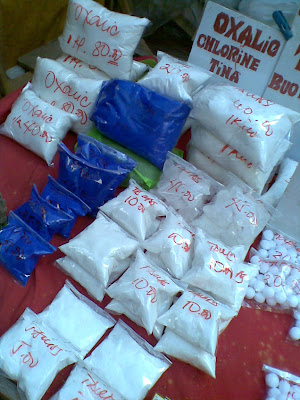Government Urged to Adopt "Kid-Safe" Chemicals School Policy after Food Poisoning that Killed 2 Kinder Students

 (Photos by Manny Calonzo)
(Photos by Manny Calonzo)The fatal food poisoning of two kindergarten pupils in a public school in Cagayan province should rouse the government into reviewing chemical safety practices and procedures in schools, a toxic watchdog said.
“We urge Education Secretary Armin Luistro to order a thorough probe of the dreadful incident and initiate a review of current chemicals policies and protocols in all schools to prevent a repeat of the tragic chemical error that claimed innocent lives in Tuguegarao City,” said Velvet Roxas, Steering Committee member of the EcoWaste Coalition.
Last Tuesday, 43 students and three teachers of Larion Bajo Elementary School in Tuguegarao City were rushed to the Cagayan Valley Medical Center due to a tragic food poisoning that killed two girls.
According to police and media reports, Eloisa Ballad and Jessica May Bangayan, both five years old, died after consuming a teacher-prepared “miki” noodles in the school canteen that was mistakenly “salted” with oxalic acid powder, a bleaching agent.
Oxalic powder, whose appearance and texture is similar to fine salt or refined sugar, is sold in the market at eighty pesos per kilo, confirmed an EcoWaste Coalition's "AlerToxic Patroller" who managed to buy a 1/4 kilo pack for twenty pesos this morning from vendors in Ylaya St., Divisoria, Manila.
Citing online material safety data sheet (MSDS) of oxalic acid, the EcoWaste Coalition said that the substance is very corrosive to the human body and may be fatal if inhaled, swallowed or absorbed through the skin.
Last Tuesday, 43 students and three teachers of Larion Bajo Elementary School in Tuguegarao City were rushed to the Cagayan Valley Medical Center due to a tragic food poisoning that killed two girls.
According to police and media reports, Eloisa Ballad and Jessica May Bangayan, both five years old, died after consuming a teacher-prepared “miki” noodles in the school canteen that was mistakenly “salted” with oxalic acid powder, a bleaching agent.
Oxalic powder, whose appearance and texture is similar to fine salt or refined sugar, is sold in the market at eighty pesos per kilo, confirmed an EcoWaste Coalition's "AlerToxic Patroller" who managed to buy a 1/4 kilo pack for twenty pesos this morning from vendors in Ylaya St., Divisoria, Manila.
Citing online material safety data sheet (MSDS) of oxalic acid, the EcoWaste Coalition said that the substance is very corrosive to the human body and may be fatal if inhaled, swallowed or absorbed through the skin.
“Inhalation of dust or mist may cause irritation or burns to upper respiratory system, nose, mouth or throat. Ingestion may cause irritation or burns to mouth throat or stomach. Contact with skin or eyes may cause irritation or burns,” the MSDS warns.
This latest incident of chemical poisoning should lead to the adoption and enforcement of a “kid-safe” chemicals policy, an integral component of a healthy school program, the EcoWaste Coalition emphasized.
Such policy should allow the use of only kid-safe chemicals and products in classrooms, laboratories, canteens, lavatories, gardens and also in school activities from the “Brigada Eskwela” clean-up to educational and cultural events.
On the other hand, it should disallow the use of chemicals that pose serious health threats to children, especially reproductive and developmental toxicants like lead, mercury and other chemicals of public health concern.
The envisioned policy should likewise promote the use of non-chemical alternative products and processes to minimize chemical use and exposure in classroom and out-of-classroom activities.
Also, the policy should incorporate chemical safety information to keep administrators, teachers, non-teaching personnel and the students informed and vigilant about chemical hazards, including precautions against chemical exposure and procedures in case of chemical spills and accidents.
-end-
Reference: Oxalic acid MSDS: http://www.sciencestuff.com/msds/C2193.html





Comments